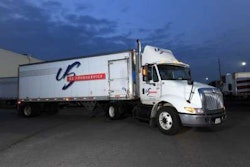The Coalition for Transportation Productivity, a coalition of more than 100 shippers and allied associations seeking increased federal weight limits on interstate highways, on Wednesday, July 15, announced the results of a national poll that it says demonstrates that a majority of Americans support raising interstate truck weight limits without making trucks larger.
CTP says more than half of Americans surveyed favor allowing trucks with proper safeguards to carry more weight on U.S. interstates as a way to make roads safer, reduce environmental impact and strengthen the economy. CTP says the results of its commissioned national poll reveal broad support for responsible truck weight reform as outlined in The Safe and Efficient Transportation Act of 2009 (H.R. 1799).
“Americans solidly back the same truck weight reform proposed by H.R. 1799, providing strong support for Congress to responsibly raise the federal vehicle weight limit,” says CTP Co-Chair John Runyan. “With truck traffic already increasing 11 times faster than road capacity and freight expected to double by 2025, H.R. 1799 would make sure America’s shipping needs are met in a way that improves highway safety and reduces our carbon footprint.”
Among the survey’s key findings, according to CTP:
A majority of Americans favor higher weight limits for properly outfitted trucks. By a margin of 51 percent to 39 percent, a majority would favor increasing the weight limit if it contributes to safer roads, greater fuel economy and more productive highway transportation;
Americans are more likely to support increasing weight limits when they learn that additional axles would make the tractor-trailers safer and better for road surfaces. A strong majority, 66 percent, would be more likely to support legislative action to allow trucks to carry more weight on interstates if those trucks add an extra axle; and
Americans also are more likely to support a weight limit increase due to positive environmental implications, with 63 percent more likely to support an increase in weight that trucks can carry on interstates if it would reduce carbon emissions and fuel consumption.
The survey was conducted among 1,000 American adults by pollster Wilson Research Strategies and has a margin of error of plus or minus 3.1 percent. The survey was executed June 16-22 via live operator telephone calls. The sample was stratified to be demographically and geographically representative of the national adult population.
Legislators in Congress are lining up on one side of the truck size and weight issue or the other. The CTP-backed legislation (H.R. 1799) introduced by Reps. Michael Michaud (D-Maine) and Jean Schmidt (R-Ohio) would authorize states to allow trucks with a gross weight of up to 97,000 pounds to operate on interstate highways within their state provided that trucks operating above 80,000 pounds add a sixth axle, with brakes. In addition, heavier vehicles would pay a fee that would be dedicated to bridge investments in states that authorize their use. The American Trucking Associations supports H.R. 1799, saying it could allow trucking companies to use more efficient vehicles to deliver more freight while making fewer trips. The result, ATA says, would be fewer crashes, less fuel burned, less congestion and reduced carbon and toxic emissions.
On the other side, Sen. Frank Lautenberg (D-N.J.) and Rep. James McGovern (D-Mass.) introduced legislation (S. 779, H.R. 1618) that would extend the current limit of 80,000 pounds and maximum length of 53 feet for tractor-trailer trucks on interstate highways to the National Highway System. The NHS covers some 160,000 miles of highway, while interstates represent 44,000 miles. Within the trucking community, the Owner-Operator Independent Drivers Association and the International Brotherhood of Teamsters are backing the Lautenberg-McGovern bill, citing safety and infrastructure concerns.











